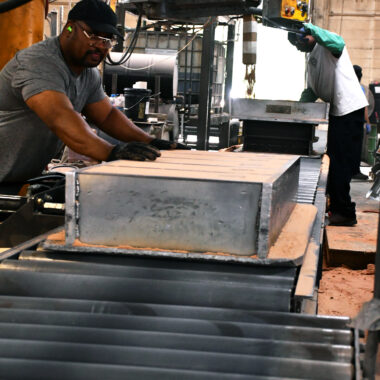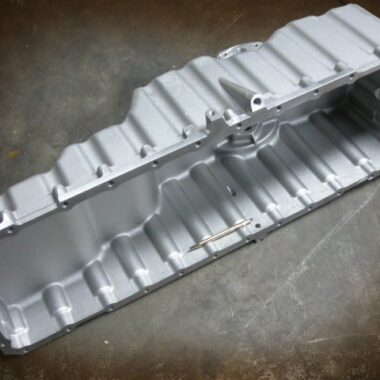Enhancing Outcomes: Casting Aluminum Like a Pro
Enhancing Outcomes: Casting Aluminum Like a Pro
Blog Article
Aluminum Casting Solutions Unveiled: Necessary Insights and Tips
Exploring the realm of aluminum casting services can unveil a globe of elaborate procedures and nuanced considerations that are crucial for effective results. As we venture into the realm of aluminum casting solutions, prepare to uncover the vital aspects that can shape the trajectory of your jobs and boost your understanding of this elaborate craft.
The Essentials of Aluminum Casting
What fundamental processes are involved in aluminum casting that form the backbone of this commonly made use of manufacturing technique? Aluminum casting is a functional and economical method used in numerous sectors to develop complicated and complex metal components. The procedure starts with the melting of light weight aluminum ingots in a heater, normally at temperatures varying from 1220 ° F to 1670 ° F, depending upon the specific aluminum alloy being made use of. Once molten, the aluminum is poured into a pre-designed mold and mildew tooth cavity, where it takes the form and solidifies of the mold and mildew.
After solidification, the mold is removed, and the casting undergoes finishing procedures such as heat surface, machining, and therapy covering to satisfy the required requirements. Understanding these basic procedures is necessary for accomplishing high-grade light weight aluminum spreadings with mechanical buildings and exact dimensions.
Various Casting Approaches Described
Discovering the numerous techniques utilized in aluminum spreading uses beneficial understandings into the diverse techniques used to accomplish precise and complex steel components. One usual method is sand spreading, where a mold is produced making use of compressed sand around a pattern of the wanted component. Another approach, die spreading, includes injecting liquified light weight aluminum right into a steel mold under high pressure.
Factors to Take Into Consideration When Choosing a copyright
When choosing an aluminum casting provider, evaluating their experience and experience is critical for making sure quality and integrity in the production procedure. The copyright's experience in the field suggests their experience with different spreading methods, prospective challenges, and best practices. It is important to ask about the sorts of tasks they have actually serviced in the past, guaranteeing they align with the complexity and specs of your very own project.
Additionally, take into consideration the service provider's reputation within the market. Search for evaluations, testimonies, and case researches that demonstrate their ability to provide top quality light weight aluminum castings consistently. A credible company will certainly often have certifications or associations with industry companies, showcasing their dedication to quality and adherence to sector requirements.
Moreover, examine the copyright's abilities in terms of personalization, volume needs, and project timelines. Make sure that they can accommodate your certain demands and have the flexibility to scale production as called for. Efficient communication and openness pertaining to costs, preparation, and quality assurance procedures are also critical variables to think about when choosing a light weight aluminum casting company.

Common Obstacles and Solutions
Navigating with the intricacies of light weight aluminum spreading processes typically provides manufacturers with a collection of challenges that need innovative options to make certain efficiency and top quality in production. One usual difficulty faced in light weight aluminum spreading is the development of defects such as porosity, contraction, or incorporations due to incorrect mold layout or insufficient steel high quality.
Executing advanced technologies like computer-aided design (CAD) and computer system mathematical control (CNC) machining can boost precision and consistency in light weight aluminum spreading. By spending in automation and real-time monitoring systems, makers can improve process control and lessen variations, ultimately enhancing the overall high quality of aluminum cast products.
Tips for Optimizing Your Casting Projects
To boost the effectiveness and quality of your aluminum casting jobs, applying tactical optimization strategies is important. One essential pointer for maximizing your spreading jobs is to meticulously make the gating system. By guaranteeing that the gating system is properly designed and correctly placed, you can enhance the flow of liquified light weight aluminum and decrease the opportunities of issues read the full info here in the last spreading. In addition, utilizing computer simulations can help in examining the circulation and forecasting of steel throughout the casting procedure, permitting for modifications to be made before real production starts.

Verdict
To conclude, comprehending the essentials of light weight aluminum spreading, various casting techniques, factors to think about when selecting a supplier, usual challenges and remedies, and ideas for enhancing spreading tasks are necessary for effective end results. By adhering to these insights and applying best businesses, techniques and individuals can make sure efficient and effective aluminum casting services that fulfill their details needs and needs.
Understanding these fundamental processes is crucial for attaining top notch light weight aluminum spreadings with mechanical residential properties and accurate dimensions.
When choosing a light weight aluminum casting service company, assessing their experience and experience is vital for making sure top quality and reliability in the manufacturing process. Reliable interaction and openness regarding costs, lead times, and high quality control procedures are likewise critical aspects to consider when selecting an aluminum casting service provider.
Navigating through the complexities of light weight aluminum spreading processes More Help commonly offers suppliers with a collection of challenges that call for ingenious remedies her explanation to make sure efficiency and top quality in production. One typical challenge faced in light weight aluminum spreading is the formation of problems such as porosity, shrinkage, or additions due to inappropriate mold style or poor metal high quality.
Report this page